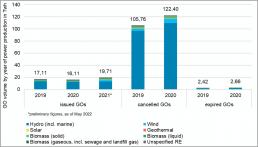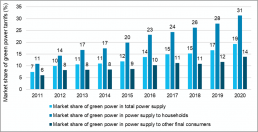Prospects for the further development of Guarantees of Origin for electricity (Energy Sources - Report E1)
In the electricity sector, Guarantees of Origin (GOs) have so far been the only established and legally secure instrument to prove the renewable energy (RE) property and thus to prevent the double marketing of renewable electricity – in Germany, in the European Union (EU) and beyond. Even though the purposes of GOs may differ by country, their scope of application is fundamentally limited at the European and at the national level. For example, according to Article 19 of the Renewable Energy Directive (EU) 2018/2001 (RED II), GOs only serve the purpose of consumer information (especially in the context of electricity disclosure) and have hardly any functions with regard to the fulfilment of legal specifications and requirements.
However, the increasing market demand for green electricity, changes in the demand structure as well as new regulatory requirements (e.g. due to the existing European Renewable Energy Directive (REDII) and its amendment (REDIII)) influence the demands on verification systems for renewable electricity in the EU member states, which necessitates a further development of these systems and their applications. In this context, it is important to clarify which role the existing GO systems will play in the future in the verification of renewable electricity and how these systems should be extended or supplemented with new systems.
The design of any further developments of electricity GOs or new systems should be based on the intended use of verification, take into account interactions with the verification of other renewable energy sources (e.g. mass balancing systems for gases) and be worth the cost or effort. In addition, the most important function, namely the prevention of double marketing (Article 19 (2) and (6) RED II), must be guaranteed through reliable and secure verification of the origin of renewable electricity.
This report initially presents the current practice (section 2) and the new requirements and challenges (section 3) in the area of renewable electricity certificates. Subsequently, various perspectives for the further development of the German electricity verification system that take account of the upcoming requirements are explored (section 3.2). The existing electricity certificate system, within its given national and European legal framework, forms the basis of the analysis, but considerations beyond this are also presented. Finally, the results are summarised in section 5.
Issuance, cancellation and expiry of EECS GOs from RE in Germany (by year of underlying electricity production)
Source: Hamburg Institut, based on AIB 2022, Activity statistics (Annual Fuel-Level 2, as of May 2022).
Share of green electricity in electricity sales to German consumers
Source: Hamburg Institut, based on data from Bundesnetzagentur/Bundeskartellamt, Monitoring Reports 2010-2021. The calculation of the market shares of green electricity is based on survey data from utilities on the volume of power marketed in dedicated green electricity tariffs (2020: 73.4 TWh) and on the total volume of electricity sold to final consumers (2020: 380.9 TWh). In 2020, the respondents sold 37.2 TWh of green electricity to households (total: 118.8 TWh) and 36.3 TWh to other consumers (total: 262.2 TWh)



